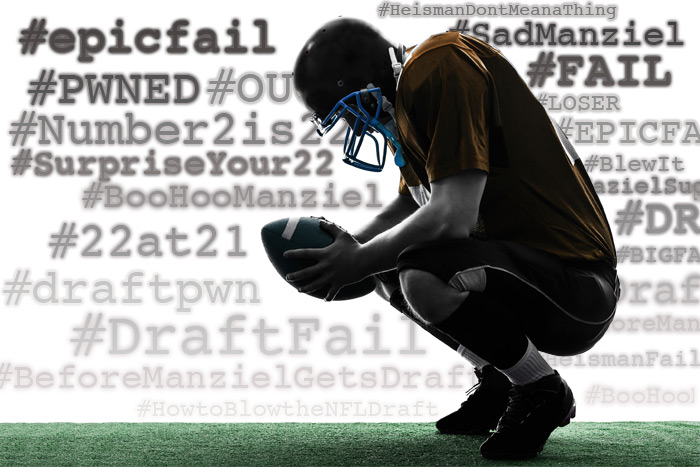The Draft: Johnny Manziel, Hurt Feelings, Beyoncé and Social Media Sensitivity

There was an article in The New York Times last Sunday about a pro football quarterback named Johnny Manziel.
In 2012, at the end of the season as quarterback for Texas A&M, he was selected as the best college player in football, the Heisman Trophy winner. After the following season, he sat front row, center, in the green room at the NFL Draft as the teams made their selections from the new young players now eligible for the pros. Fame and fortune awaited. What happened, however, was that team after team passed over him. He worried. He was finally selected, as the 22nd draft pick by the Cleveland Browns, a selection so low as to almost be an insult to this young man.
The essence of this article, written by reporter John Branch, is that the humiliation of being passed over like this, so publicly before maybe 10 million TV viewers, may have contributed to ruining his life. The tweeting and social media public’s reaction to his anticipation and disappointment was withering and cruel, he opined. Manziel became the butt of a joke. This was bullying to an extreme. It was everything that is wrong with America.
The author goes to great lengths after this to show how horrible things have gone for Johnny Manziel—known by all since his college days as “Johnny Football.” He lasted two seasons with Cleveland, but after the second year they cut him. He’s now been seen out in California, going to parties and bars and generally having a bad time. There’s a photo of Manziel at one of these parties looking wasted. (Am I allowed to say that?) Rumors of substance abuse have swirled. Last week he was indicted on a misdemeanor charge for allegedly assaulting his girlfriend.
“To read online comments and social media posts about Manziel’s troubles—arrests, parties, rehabilitation—is to explore the underbelly of fandom, dismissive and cruel,” Branch wrote. “Schadenfreude is the flip side of reverence…”
Reporter Branch compares Manziel’s humiliation to the horrific damage done by not having proper football helmets to fend off the cruel blows of opposing linemen. The 2016 NFL Draft was last week. These young men are only 20 or 21 when they have to go through this ordeal of being on TV watching themselves get passed over and judged by not only the football coaches but the millions of fans just waiting to make fun of them. Who knows what psychological damage will befall those who have to go through this. In a world of politically correct behavior, here is another example of the ruination of the human soul.
“Knowing what we know about things like concussions and addictions; the possibility of chronic traumatic encephalopathy, or C.T.E, and the likelihood of a shortened life expectancy, you might think that we have moved past viewing football players as interchangeable parts to be haggled or numbers to be calculated,” Branch wrote.
Indeed, this is the sort of article that we expect to read these days. A happens. B is the result.
And yet, deep down in the article, there is information about Manziel’s life of trouble before he went to the draft. He was arrested for being involved in a fight before he even went to college. He was hired with high hopes at a selective camp to help train young prospects, but got kicked out for oversleeping the training sessions. Hmmm. Is it possible that Manziel’s troubles were the cause of his catastrophe at the draft rather than the catastrophe at the draft being the cause of his troubles?
Also, it was mentioned in the article that Manziel, wily and crafty as he was as a quarterback in college, may simply be too short and light for the pros. Don’t we live in a country now that celebrates everyone, short or tall, black or white, heavy or thin? Shall we allow the draft to consider these things when making their selections? How cruel are we to permit them to be?
Also in the news this week is Beyoncé’s new album, Lemonade, with songs that deal with Beyoncé’s anger, love, frustration and sadness—good to see that someone this famous can suffer with things just like the rest of us. However, the social media that resulted from this album release was so powerful that it sent a young designer named Rachel Roy into online hiding. Roy is indirectly hinted at in Beyoncé’s album as the woman who she believes was having an affair with her husband, Jay Z.
Rachel Roy, when married to Damon Dash, visited the Hamptons from time to time. But as it happens, the well known chef and cookbook writer Rachael Ray lives in Southampton and was also attacked because people are so dumb they don’t know Ray from Roy or Rachel from Rachael. By the way, Beyoncé never mentions Rachel Roy by name, and Rachel Roy denies she’s had an affair with Jay Z (as does Rachael Ray.)
Every society has its way of humiliating those who it believes, even sans evidence, have transgressed. In Colonial times, a woman who was believed to have committed adultery would be forced to walk around with a big letter A sewn on her dress. In the radical Muslim world, those who transgress get hanged, stoned or decapitated. Here we get tweeted.
To paraphrase President John F. Kennedy, it matters not what Twitter does for you, it is what you do with Twitter. This article is my attempt to lash out at the twits, the Facebookers, the commenters and the bloggers. They know not what they do.
In recent months, public employees, both school superintendents out here, have been vilified by the twits in social media for alleged, and in one case unspecified, transgressions and quit their jobs (one with a reported $300,000 school district payout) to find new employment elsewhere.
Three weeks ago, I wrote an article about Patchogue, where Presidential candidate Donald Trump was planning to speak. The hall he would speak in was 200 yards from where an Ecuadorian immigrant was shockingly stabbed to death by high school kids from the community out wilding in 2008. I thought it was insensitive, to say the least, that that man would speak there, given his own comments about Hispanics and other people of different backgrounds.
The article was widely read—it was on top of the list for DansPapers.com that week—and I was advised by friends not to read the filthy, bullying, threatening and insulting comments that it drew. But I did anyway.
They affected me. And they reminded me that Patchogue has come a long way since the bad old days of 2008 in bringing people of various races together to improve the community. Today, Patchogue is a fine town with its problems behind it, for the most part. I had failed to mention that. And so I wrote my own apology for having failed to note that in my story. The first comment after that, apparently after taking in what I wrote, was to note that most of the other writers didn’t mention that the Hispanics have essentially taken over Patchogue.
What can you do with comments like this?
The bottom line here is that we have become a people who, instead of celebrating our freedoms and the opportunities they afford, have assumed every hurt is a constitutional right wronged, blame others, feel entitled to everything for free, get crazy while being terrified, feel free to speak out in vicious and threatening ways in social media and like a gaggle of geese are quick to join a chorus with others to condemn people about anything whatsoever.
God bless what’s left of America.



